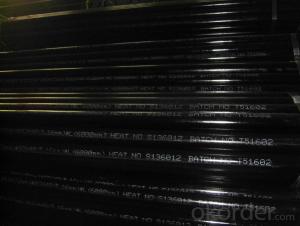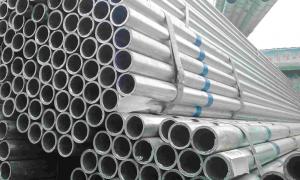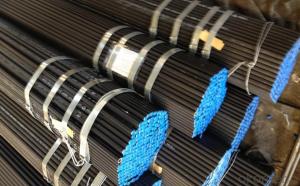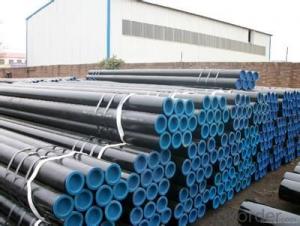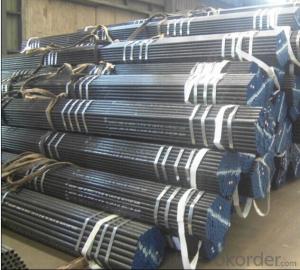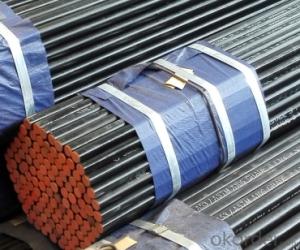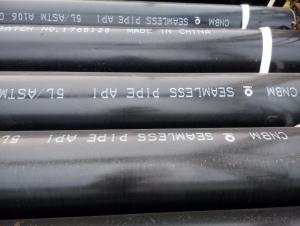2 1/2 INCH Seamless steel pipe API 5L/ASTM A 106/ASTM A53GR.B
- Loading Port:
- Tianjin
- Payment Terms:
- TT or LC
- Min Order Qty:
- 10 m.t.
- Supply Capability:
- 5000 m.t./month
OKorder Service Pledge
OKorder Financial Service
You Might Also Like
There is a hollow section in seamless pipe and no seam around the steel. It is produced with solid bar by perforation. Seamless pipe does good in the field of pressure resistance and security than other classifications.You deserve it.
2、Main Features of the Seamless Pipe:
• High working accuracy
• High strength
• Small inertia resistance
• Strong therming dissipine ability
• Good appearance
• Reasonble price
3、Seamless Pipe Specification:
Standard | GB, DIN, ASTM ASTM A106-2006, ASTM A53-2007 |
Grade | 10#-45#, 16Mn 10#, 20#, 45#, 16Mn |
Thickness | 8 - 33 mm |
Section Shape | Round |
Outer Diameter | 133 - 219 mm |
Place of Origin | Shandong, China (Mainland) |
Secondary Or Not | Non-secondary |
Application | Hydraulic Pipe |
Technique | Cold Drawn |
Certification | API |
Surface Treatment | factory state or painted black |
Special Pipe | API Pipe |
Alloy Or Not | Non-alloy |
Length | 5-12M |
Outer Diameter | 21.3-610mm |
Grade | 20#, 45#, Q345, API J55, API K55, API L80, API N80, API P110, A53B |
Standard | ASME, ASTM |
1) Material:20#(ASTM A 106/A53 GRB.API5LGRB,GB),45#,16Mn,10#.
2) Specification range: OD: 21.3-610mm, WT:6-70mm, length:6-12m or according to the requirement of clients.
3) Executive standards: GB, ASME API5L.ASTM A 106/A53 and standards that meet the requirements of our clients!
4) Surface: black lacquered, varnish coating or galvanized.
5) Ends: Beveled or square cut, plastic capped, painted.
6) Packing: bundles wrapped with strong steel strip, seaworthy packing.
4、Packaging & Delivery:
Packaging Details: | seaworthy package, bundles wrapped with strong steel strip |
Delivery Detail: | 15-30days after received 30%TT |
5、FAQ of Seamless Pipe:
①How is the quality of your products?
We test on every pipe before delivery. All goods are strictly satisfy standard home and abroad. If products’ quality is not the same with our description, we promise 100% refund.
②How about the price?
Yes, we are factory and offering you the lowest price. Our policy is that “ to save time and be honest with our business relationship, we quote as low as possible for every client”, if you love bargain, just don’t waste your time. Our quotation is great.
③Why should you choose us?
Choice happens based on our quality and price. Besides, you can get professional products inquiry, products train (for agents), speedy goods delivery, outstanding customer proposals. SGS test is available. Customer inspection and third party inspection are OK.
6、Seamless Pipe Images:
- Q: How are steel pipes protected against galvanic corrosion?
- Steel pipes are protected against galvanic corrosion through the use of sacrificial anodes, coatings, or the application of electrical currents. These methods create a barrier or redirect the corrosion process, preventing the steel pipes from deteriorating due to galvanic reactions.
- Q: What are the different methods of inspecting steel pipes for defects?
- There are several methods of inspecting steel pipes for defects, including visual inspection, magnetic particle inspection, ultrasonic testing, radiographic testing, and eddy current testing. Each method has its own advantages and limitations, and the choice of inspection method depends on factors such as the type of defect being searched for, the size and shape of the pipe, and the desired level of accuracy and sensitivity.
- Q: What are the specific differences between flexible pipes and rigid pipes?
- The rigid waterproof sleeve is used in the wall of the building which does not need to bear the vibration and expansion deformation of the pipe, and the wall thickness is 200mm in general;Flexible waterproof sleeve is mainly applicable to the wall of buildings with seismic requirements, pipeline vibration and expansion deformation, and strict waterproof requirements, and the wall thickness is 300mm
- Q: Is the same specification seamless steel pipe more expensive than welded pipe?
- Welded steel pipe refers to the use of steel or steel plate bending deformation into a round, square and other shapes after welding into the surface of the joint of the steel pipe. The blank used in welded steel pipe is steel or strip steel.
- Q: How are steel pipes protected during transportation and storage?
- Steel pipes are typically protected during transportation and storage through various measures such as corrosion prevention coatings, wrapping them with protective materials like plastic or rubber, and securing them properly to prevent any damage or movement.
- Q: What are the different types of gaskets used with steel pipes?
- There are several types of gaskets commonly used with steel pipes, including ring type joint (RTJ) gaskets, spiral wound gaskets, and flat gaskets. RTJ gaskets are designed to create a tight seal by compressing between two flanges, while spiral wound gaskets consist of a metal winding and filler material for enhanced sealing properties. Flat gaskets are typically made from rubber or non-metallic materials and are used for lower pressure applications.
- Q: How are steel pipes classified based on pressure ratings?
- Steel pipes are classified based on pressure ratings into different categories such as schedule numbers or pressure classes, which indicate their ability to withstand different levels of pressure.
- Q: What is the role of steel pipe manufacturers in sustainable development?
- Steel pipe manufacturers play a crucial role in sustainable development by promoting environmental responsibility, resource conservation, and reducing carbon emissions. They contribute to sustainable development by adopting cleaner production techniques, recycling waste materials, and investing in research and development to improve energy efficiency. Additionally, they prioritize worker safety and adhere to stringent quality standards, ensuring the durability and longevity of their products, which further supports sustainable construction practices.
- Q: Can steel pipes be used for geothermal systems?
- Yes, steel pipes can be used for geothermal systems. Steel pipes are commonly used in geothermal systems for their high strength, durability, and ability to withstand high temperatures and pressures. They are also resistant to corrosion, making them suitable for long-term use in geothermal applications.
- Q: Are steel pipes suitable for transporting chemicals?
- Yes, steel pipes are suitable for transporting chemicals. Steel pipes have excellent strength and durability, making them capable of handling various corrosive chemicals and maintaining their structural integrity. Additionally, steel pipes can withstand high pressure and temperature, making them a reliable choice for chemical transportation.
Send your message to us
2 1/2 INCH Seamless steel pipe API 5L/ASTM A 106/ASTM A53GR.B
- Loading Port:
- Tianjin
- Payment Terms:
- TT or LC
- Min Order Qty:
- 10 m.t.
- Supply Capability:
- 5000 m.t./month
OKorder Service Pledge
OKorder Financial Service
Similar products
Hot products
Hot Searches
Related keywords
